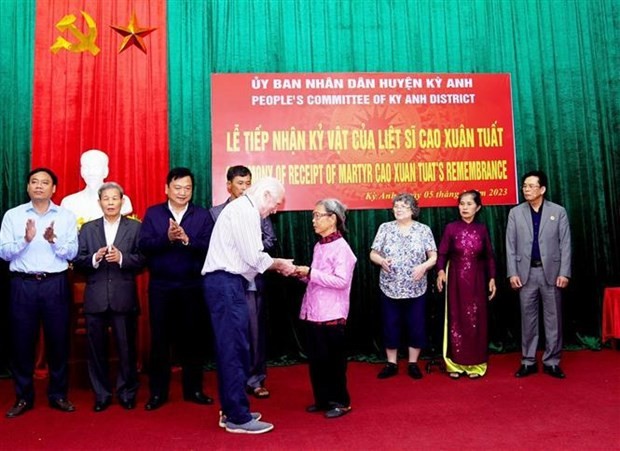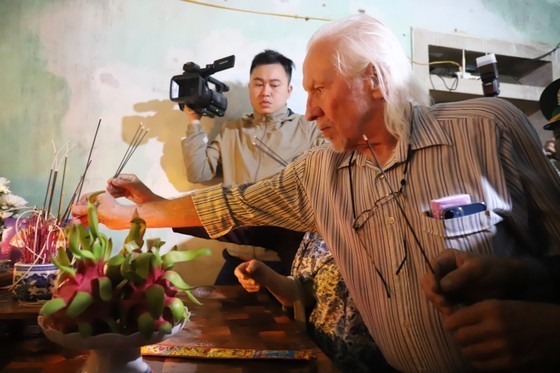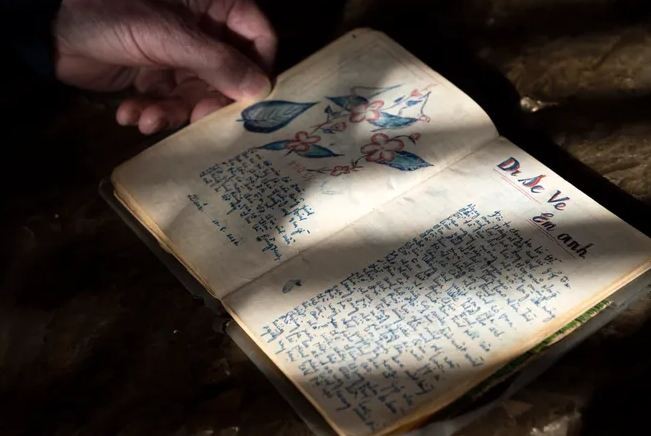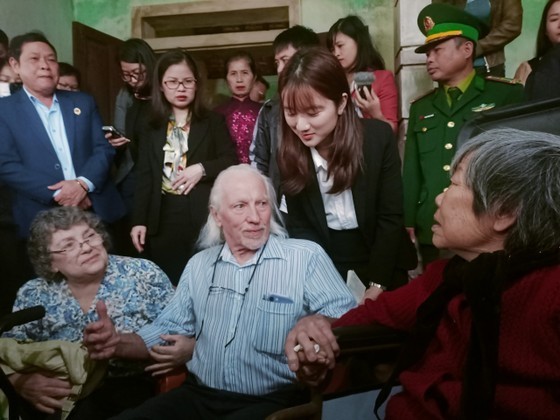 |
| US veteran Peter Mathews and his wife this morning attended a ceremony of receipt of Martyr Cao Xuan Tuat’s Remembrance in Cao Thang Village, Ky Xuan Commune, Ky Anh District, Ha Tinh Province after 56 years of keeping the notebook. Photo: VNA |
US veteran Peter Mathews and his wife on March 5 arrived in Ky Xuan commune, Ky Anh district, the central province of Ha Tinh, to hand over martyr Cao Xuan Tuat’s diary that he has kept for the past 56 years to his family.
The US veteran and his wife visited the house of Ha Huy My who is 62 years old and is the closest surviving relative of the diary’s owner in Cao Thang Village.
At My’s house, the US veteran and his wife offered incense and two dried roses along with the diary to late Vietnamese soldier Cao Van Tuat.
 |
| US veteran Peter Mathews offered incense to late Vietnamese soldier Cao Van Tuat. Source: SGGPO |
Mathews found the war diary on the battlefield among belongings of Vietnamese soldiers who laid down their lives, after surviving the battle of Dak To in the Central Highlands in November 1967.
The notebook’s contents consisted diary, poem, lyrics and autobiography of late Vietnamese soldier Cao Van Tuat demonstrating his ideal spirit and volunteering to enlist in the army to defend the country.
“I just thought it was such a beautiful thing,” he recalled. “I was amazed by the detail, the artistic ability. Whoever wrote it must be an educated person.”
“Maybe I should have turned it in, but I just couldn’t part with it,” he said. “It didn’t look to me like military or secret information. I didn’t show it to anyone, I just put it in my pocket.”
For over half a century, the diary had been kept at Peter Mathews’ home in Bergenfield city, New Jersey state of the US. Mathews always hopes that if possible, he will come back to Vietnam to find the owner of the notebook and return it.
“My dream is if we can find him, to take a trip out there and present it,” he said. “I plan to put closure to it. At my age, now I feel it’s time.”
 |
| Photo courtesy of Peter Mathews |
When he returned home to New Jersey, Mathews tried to put his war experiences behind him. He got married, started a family and built a small construction business. The small 93-page diary was set aside in a box in his attic.
Every now and then, he took the diary out of storage to show family members, but he never talked much about his war experience with his four children, now in their 40s and 50s.
It wasn’t until Mathews was working at a job in Upper Saddle River a little more than a year ago that his interest in the book was rekindled.
Mathews spotted a nón lá, a traditional conical straw Vietnamese hat in a customer’s home office. That sparked a conversation with the client, who had adopted two children from Vietnam and had visited the country several times. Mathews returned to the man’s home with the diary, and the client offered to have one of his friends translate some of its pages.
The story was then published on North Jersey newspaper on January 27, 2023, and the information was shared via the Internet to Vietnam with an image of the diary and the information of its owner.
Mathews began posting pages from the diary on social media, hoping to get more information. He heard from a professor at Harvard who was interested in researching the diary with his students, and a collector who offered USD 1,200 for the booklet.
Mathews got advice from Andrew Pham, who translated the bestseller I Dream of Peace, the wartime diary of doctor Dang Thuy Tram, and Frances Fitzgerald, a journalist who covered the war and wrote the introduction to Pham’s book, should he want to explore getting the diary published.
After news of the lost diary spread, Chairman of the provincial Fatherland Front Committee Tran Nhat Tan contacted Mathews.
His daughter transferred the notebook’s contents to the Vietnamese officials to verify.
The breakthrough of the investigation came when Mathews sent the page containing details of Tuat’s family. The page detailed the family’s address. Tuat even wrote his parents and his older sister’s name in the book.
The Ha Tinh officials quickly went to work and searched hundreds of files on veterans and martyrs with the first name Cao born in the province.
The page detailed the family’s address as in Cao Thang Village in Ky Xuan Ward, Ky Anh District, Ha Ttnh. Tuat even wrote his parents and his older sister’s name in the book.
The Ha Tinh officials quickly went to work and searched hundreds of files on veterans and martyrs with the first name Cao born in the province.
 |
| US veteran Peter Mathews and his wife visit Cao Thi Dieu, the sister of martyr Cao Xuan Tuat. Source: SGGPO |
Ha Huy My shared that in 1963, his uncle joined the army without getting married and battled on the Southern front. By 1972, the family received a death notice without any memento. Thus, the dairy of his uncle was considered a sacred memento and his family was very happy and touched.
Tuat, born in 1942, had one older and two younger sisters in a family of six. He joined the army in 1963 and fought many battles in the Central region.
Tuat was confirmed dead on December 10, 1967, around the same time that Mathews found the notebook, but his family did not receive the news until 1972.
Tuat is currently interred in a cemetery in Hoai Nhon, Binh Dinh Province, but his remains are not fully regrouped, and Tuat did not even have a remembrance portrait.
The diary Mathews held onto is perhaps the only remaining vestige and memory of Cao Văn Tuat.
“My uncle’s passing has left a great hole in our family’s life,” said My. “For almost sixty years after he was pronounced dead, my mother and my aunt (Tuat’s sisters) kept waiting for news of his remains.”
“After we learned that an American veteran currently kept my uncle’s notebook, we were so happy that we could not sleep,” said My.
With best wishes to the martyr’s family, Mathews wishes the family to keep and keep the diary carefully.
Mathews also expressed that he considers the diary as part of his life while in Vietnam. When he learned that he could go to Vietnam to return the diary, he felt relieved that he had fulfilled his mission.
Returning to Vietnam after more than half a century and coming to the land of Ha Tinh, Mathews also expressed a very different impression of Vietnam, a peaceful and prosperous developing country. Vietnamese people are lovely, hospitable and friendly.
Writer Chu Lai: War and Literature
The war in Vietnam has been over for nearly 40 years and many soldiers have returned home with unforgettable memories. One of them is Chu Lai, a prolific author who has not only won the people’s respect for his famous stories about war and the post-war era, but also for his dramatic stage and movie work.
Secret War Bunker in Thang Long Citadel
The underground bunker is located west of the Department of Operations, the General Staff of the Vietnam’s People Army in the imperial citadel of Thang Long in downtown Hanoi. It played an important role in the American war, especially during the 12 days and nights of the Hanoi-Dien Bien Phu air battle 40 years ago. Recently, the bunker was restored by the Thang Long Heritage Preservation Centre and was officially opened to tourists.








